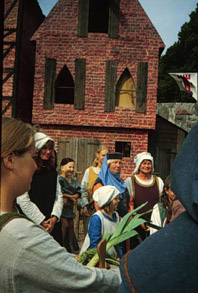Meet the Middle Ages
BackThe proper way to live

People in the Middle Ages had a common view on what mattered in life and how one should live. Their shared Christian faith affected much of what they did and thought.
This is what medieval men and women thought was the right way to live: 1) Believe in God, 2) Hope for salvation and eternal life, 3) Love god and your fellow humans, 4)Be fair in all situations, 5) Be brave and stand up for your opinions and beliefs, 6) Be moderate and share with other people, 7)Seek knowledge, in theory and in practice, in order to cope with life. These rules were known as "the Seven Virtues".
The opposites of the seven virtues are the seven deadly sins. They were: 1) greed (to want more and more), 2) gluttony (to guzzle down food and drink), 3) jealousy, 4) anger, 5) indifference (not caring), 6) pride (to think that you are better than others), 7) sensuousness (just to think about yourself). What if we followed the virtues and avoided the sins? Then our lives would be good.
If you did wrong or harmed someone, you could go to confession. The priest then asked God to forgive your sins. Everyone went to confession at least once a year. Afterwards, you had to make up to the person you had harmed. If you had stolen, you had to repay the person you had stolen from. If you had sinned against God, you did penance. This could mean giving gifts to the Church or making a pilgrimage to the shrine of a saint.
Work was often hard and strenuous for the medieval people. Therefore, they very much looked forwards to the holidays, perhaps even more than we do nowadays. The differences between the workdays and holidays were very great. There were huge celebrations at Christmas or Easter, or at the holy days of the saints, or at christenings, weddings and funerals.
People in the Middle Ages believed that life did not end when they died. This gave them much hope. However, they were expected not to waste their lives, but to live them well.